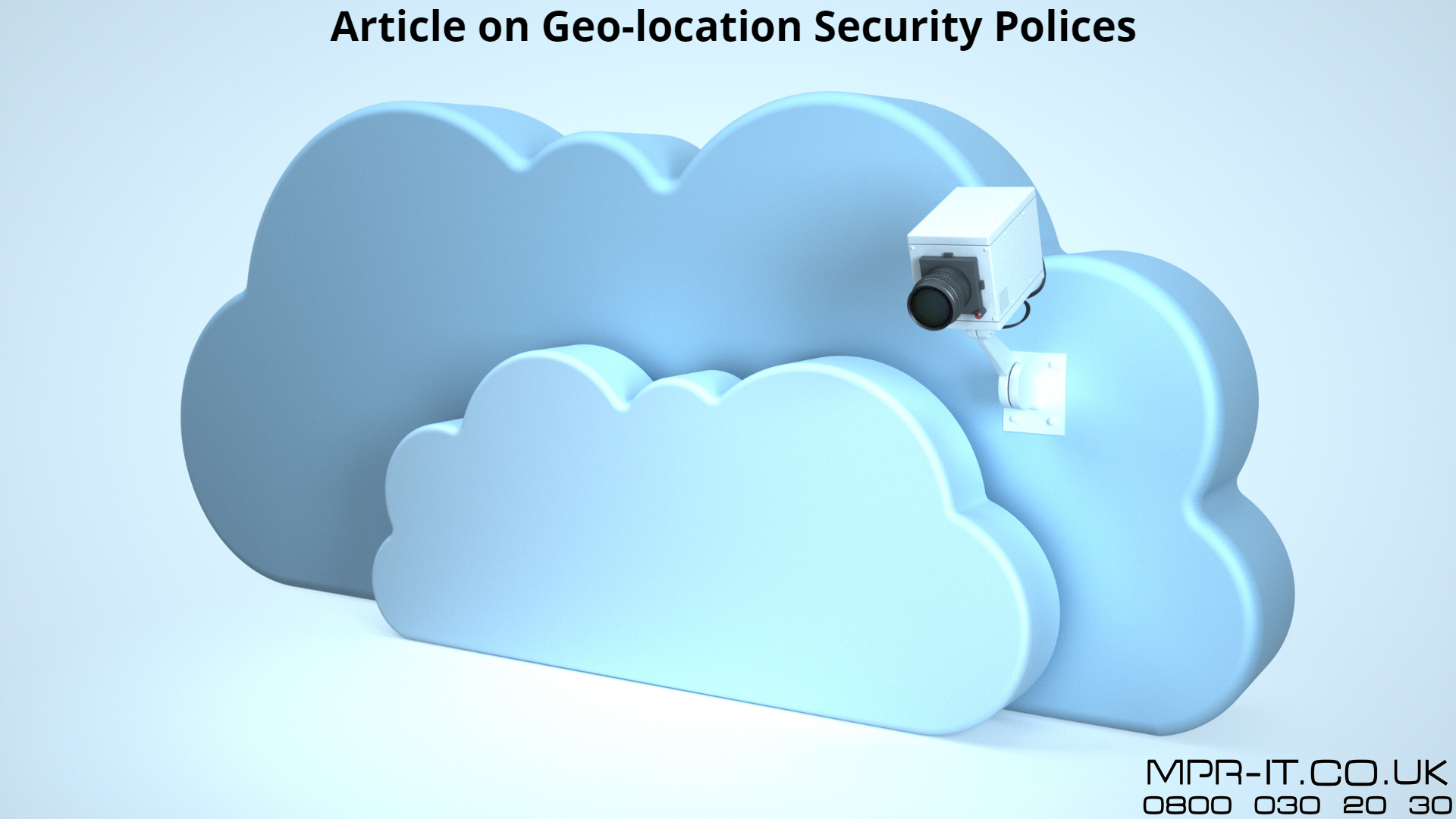What are geo-location security policies?
Geo-location security policies are specific controls that restrict access to company resources based on the user’s physical location. These policies help ensure that sensitive data and assets are only accessed from authorised locations, reducing the risk of unauthorised access or theft. Geo-location security policies can be implemented with conditional access technology, which enforces authentication requirements before granting access to corporate resources.
Anonymised data is often used in geo-location security policies to protect user privacy while still enabling effective policy enforcement. For decision-makers concerned about protecting their company’s assets, implementing geo-location security policies should be a top priority. By partnering with MPR IT Solutions for implementation and ongoing support, businesses can improve their overall cybersecurity posture and reduce potential threats stemming from unauthorised physical locations accessing sensitive information.
Definition
Geo-location data refers to the precise geographic location of a digital asset such as a mobile device, laptop, or server. This data is collected through GPS, Wi-Fi signals, and cellular towers. The collection of geo-location data can lead to valuable insights for businesses but also poses significant risks if it falls into the wrong hands.
Businesses in industries such as finance, healthcare, and government are most at risk of geo-location data breaches due to the sensitive nature of their assets. Geo-location security policies can help mitigate these risks by controlling access to this information. Some common types of geo-location security policies include authentication protocols, conditional access controls, and anonymised reporting.
Implementing effective geo-location security policies is crucial for any business that collects or uses this type of data. MPR IT Solutions offers comprehensive solutions for safeguarding your organisation’s digital assets through customised policy development and implementation strategies tailored specifically to your needs.
Importance
Implementing strong geo-location security policies is crucial for businesses to protect themselves from cyber threats. By ensuring that access to sensitive data and resources is restricted based on the user’s physical location, businesses can prevent unauthorised access and potential breaches. Some benefits of implementing geolocation security policies include:
- Protection of assets: Geolocation security policies help in protecting a business’s digital assets such as customer data, intellectual property, and financial records by restricting access based on the user’s geographic location.
- Conditional Access: Policies can be set up with conditions like authentication or risk-based decisions before granting complete access to sensitive information.
- Anonymised Data Collection: With anonymisation techniques implemented within these restrictions, it ensures that no identifying personal details are exposed outside of specific regions.
Failure to implement proper geo-location security measures has resulted in negative consequences for many companies around the world. For example:
- In 2013 Target suffered a massive breach affecting over 40 million customers’ credit card information due to an HVAC subcontractor being hacked through inadequate cybersecurity protocols
- The Marriott group was fined $23M for their failure in safeguarding customer information after a major breach took place exposing millions of personal records
In addition, consumer privacy laws such as GDPR and CCPA further emphasise the need for effective geolocation security measures as they require companies handling consumer data must follow stricter guidelines on how this data is handled within different territories globally.
It is essential now more than ever that decision-makers prioritise investing in effective geo-location strategies when securing their online presence against malicious attacks while also complying with regulatory requirements set forth today!
How do geo-location security policies benefit businesses?
Geo-location security policies provide numerous benefits to businesses, particularly in terms of protection against cyber attacks and risk management. By implementing geo-location restrictions, businesses can prevent unauthorised access from outside their geographic area while also mitigating the risks associated with remote workforces. This ensures that all sensitive information remains secure at all times.
Furthermore, complying with regulatory standards is crucial for any business operating today. Geo-location security policies help organisations achieve compliance by ensuring that data is stored and transmitted only within approved locations. Not only does this prevent costly fines for non-compliance, but it also helps boost customer confidence in your ability to protect their personal information.
Protection against cyber attacks
Increased visibility and control over network traffic are essential for businesses to protect against cyber attacks. By implementing geo-location security policies, decision-makers can ensure that their networks are secure by having a clear understanding of who is accessing their systems and where they are located.
Other benefits of geo-location security policies include the ability to restrict access from high-risk areas, prevent unauthorised data access by verifying user location, and provide an audit trail of activity on the network. With these policies in place, companies can reduce the risk of cyber-attacks and comply with regulatory requirements.
- Prevents unauthorised data access
- Verifies user location
- Restricts access from high-risk areas
- Provides an audit trail of activity on the network
Regulatory compliance
Meeting regulatory compliance requirements is crucial for businesses to avoid substantial penalties and reputational damage. This includes meeting data protection laws in different regions, managing cross-border data transfer restrictions, and ensuring compliance with industry-specific regulations that require location-based controls. Failure to comply may result in lawsuits or sanctions that can be detrimental to a company’s financial health.
To meet these requirements effectively, businesses must implement geo-location security policies as part of their risk management strategy. These policies help organisations protect sensitive information by restricting access based on the user’s physical location. Here are some key considerations when implementing geo-location security policies:
- Determine which regulations apply to your business
- Identify risks associated with cross-border data transfers
- Implement proper encryption protocols for secure storage and transmission of data
- Perform regular audits and assessments to ensure continuous compliance
By prioritising regulatory compliance through effective geo-location security measures, companies can safeguard themselves against potential legal issues while demonstrating their commitment to protecting sensitive information.
Risk management
Limiting access based on location can significantly reduce the risk of insider threats. By implementing geo-location security policies, companies can restrict access to sensitive data from certain locations and ensure that only authorised employees with a valid reason for accessing such information are granted permission. In addition, monitoring and alerting suspicious activity from specific locations is crucial in detecting potential cyber attacks before they occur.
Implementing stronger security measures in higher-risk geographical areas is also essential in reducing risk exposure. By prioritising these areas as high-risk zones, businesses can enforce stricter security protocols such as multi-factor authentication and encryption to prevent unauthorised access to company resources.
To effectively manage risks associated with geo-location security policies, decision-makers should consider:
- Conducting regular audits of employee access permissions and revoking unnecessary privileges
- Enforcing strong password policies across all systems
- Implementing real-time monitoring tools for suspicious activity
- Regularly reviewing and updating security protocols
Geo-location security policies are crucial for protecting your business against cyber attacks and ensuring regulatory compliance. By limiting access based on location, monitoring suspicious activity from specific areas, and enforcing stronger security measures in high-risk zones – companies can effectively mitigate risks associated with insider threats.
How can MPR IT Solutions help implement geo-location security policies?
MPR IT Solutions can assist in implementing geo-location security policies by conducting thorough assessments and developing customised plans that align with business objectives. Our team has extensive experience in identifying potential vulnerabilities related to location-based threats such as data breaches or physical intrusions.
Once a plan is developed, MPR IT Solutions can ensure proper implementation of geo-location security policies through monitoring and regular check-ins. We provide ongoing support and maintenance to mitigate any identified risks, ensuring maximum protection for sensitive information.
Our commitment to continuous improvement means that we stay up-to-date on the latest trends and technologies in the field of geo-location security policy, allowing us to make recommendations tailored to your specific needs. Trust MPR IT Solutions for expert guidance every step of the way.
Assessment and planning
Identifying the company’s assets that need protection, determining the level of security required for each asset based on its sensitivity, and analysing potential threats and vulnerabilities to those assets are crucial steps in assessing and planning geo-location security policies. These steps help organisations understand their risks and prioritise their efforts to protect critical data properly.
To assist decision-makers with this process, we recommend using a comprehensive approach that involves:
- Conducting a thorough inventory of all assets
- Categorising the assets based on their value and sensitivity
- Identifying potential threats to each asset type
- Assessing current vulnerabilities or weaknesses in existing security measures
Through these actions, organisations can develop an effective plan for implementing geo-location security policies tailored precisely to their environment.
Implementation and monitoring
Selecting appropriate technology solutions to enforce geo-location policies is a crucial step in implementing effective security measures. It’s important to choose technology that fits your business size, industry, and specific needs. Some options include geofencing software or IP address blocking.
Regular audits should be conducted to ensure compliance with policies and identify any potential vulnerabilities. Audit frequency may depend on factors such as the level of risk involved, regulatory requirements, or changes in business operations.
Enforcing consequences for non-compliance is necessary to maintain accountability and discourage unauthorised access. This can include disciplinary action up to termination for employees who violate policy or legal action against external actors attempting unauthorised access.
Other considerations for implementation and monitoring may include employee training on policy awareness and data privacy practices, monitoring of system logs for suspicious activity, and regular updates to policies based on changing threats or regulations. By taking these steps towards secure geo-location policies enforcement businesses can protect their sensitive information from cyber-attacks while also demonstrating their commitment to customer privacy protection.
- Select appropriate technology solutions (geofencing/IP blocking)
- Conduct regular audits
- Enforce consequences for noncompliance
Continuous improvement
Regularly updating policies based on changes in technology and the threat landscape is crucial for maintaining effective geo-location security. By investigating incidents of breaches or attempted breaches, organisations can identify areas for improvement and update their policies accordingly. Providing ongoing education and training for employees on best practices also helps to ensure that everyone remains informed about potential threats.
To achieve continuous improvement within your organisation’s geo-location security policies, consider implementing these key steps:
- Conduct regular reviews of policies to ensure they are up-to-date with current industry standards.
- Utilise incident response plans during actual security events in order to assess the effectiveness of current strategies.
- Provide consistent employee training opportunities to keep staff informed about new developments in the field.
By making a commitment to continuous improvement, businesses can remain proactive when it comes to addressing any potential vulnerabilities related to geolocation data.
Contact us
When it comes to creating effective geo-location security policies, consulting with experts is crucial. Our team has years of experience in implementing successful security measures to protect businesses and their assets. Don’t leave your company’s safety up to chance – contact us today for professional guidance.
Unfortunately, there are numerous examples of companies that have suffered from a lack of proper geo-location security measures. From data breaches to physical thefts, the consequences can be devastating. But with our help, you can avoid these risks and keep your business secure. Reach out to us through email or phone and let us assist you in protecting what matters most.

